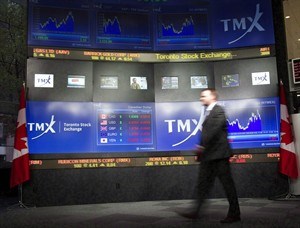
TSX to open lower, commodities swoon amid slower than expected Chinese growth
TORONTO – Resource stocks will lead the way to a sharply lower open on the Toronto stock market Monday as commodity prices tumbled in the wake of data showing much weaker than expected economic growth in China.
In addition to the pressure on oil and industrial metals, gold prices deepened a selloff that gained ground last week. The June contract on the New York Mercantile Exchange was down $97.50 at US$1,403.90 an ounce before stock North American stock markets Monday opened following a $63 drop on Friday.
The commodity-sensitive Canadian dollar also tumbled, down 0.73 of a cent to 97.91 cents US.
The world’s second-largest economy grew by 7.7 per cent over a year earlier, down from the previous quarter’s 7.9 per cent. That fell short of many private sector forecasts that growth would accelerate slightly to eight per cent.
“The GDP figure will no doubt prompt 2013 growth forecasts for China to be trimmed over the coming days,” said BMO Capital Markets senior economist Benjamin Reitzes.
The data also showed a slowdown in investment growth that is driving the latest recovery.
First-quarter growth in spending on China’s factories, real estate and other fixed assets declined to 20.9 per cent from the 21.1 per cent rate for the first two months of the year.
China has been a main pillar of support in helping the global economy recover from the recession caused by the 2008 financial collapse. Demand from China has helped support commodity prices and in turn energy and mining stocks on the resource heavy TSX.
The Chinese data helped push the May crude contract on the New York Mercantile Exchange down $1.71 to US$89.58 a barrel while May copper dropped 12 cents to US$3.23 a pound.
China has been the world’s biggest consumer of copper, which is viewed as an economic bellwether as it is used in so many applications.
Meanwhile, several reasons have been cited for the drop in gold prices.
Goldman Sachs, last week lowered its average gold-price forecast for 2013 to US$1,545 an ounce, a level it took out last Friday.
Doubts about the future of the U.S. Federal Reserve’s monetary policy program known as quantitative easing have also factored in. The program involves printing money to buy US$85 billion of bonds every month. It has had a depressive effect on the U.S. dollar in the past and helped hike gold prices since bullion is seen as an inflation hedge.
But analysts point out that if QE is ended later this year, the need for an inflation hedge is reduced.
There has also been speculation that Cyprus may sell a chunk of its reserves to finance its part of its financial rescue. Though that may not materialize, it was enough to prompt some investors to think that a gold-selling strategy may be used elsewhere in the troubled eurozone.
U.S. futures were also lower as the Dow industrial futures lost 46 points to 14,738, the Nasdaq futures declined points to 2, while the S&P 500 futures were down 7.5 points to 1,574.50.
The expected fall on the TSX will add to what is already a lacklustre year on the TSX. As of Friday’s close, the TSX was down 0.8 per cent year to date.
The Dow industrials and S&P 500 have been smashing one record after another, with the Dow ending last week two per cent higher year to date while the S&P was ahead 12 per cent.
European bourses were also negative with London’s FTSE 100 index down 1.08 per cent, Frankfurt’s DAX lost 0.98 per cent On Monday, the Paris CAC 40 shed 0.78 per cent.
Earlier in Asia, Japan’s Nikkei 225 finished 1.6 per cent lower, falling for a second straight trading day after a series of gains. The Bank of Japan’s aggressive monetary easing to lift borrowing and spending drove Japanese stocks to their highest close in nearly four years last week as well as weighing heavily on the yen.
Hong Kong’s Hang Seng sank 1.4 per cent while Australia’s S&P/ASX 200 declined 0.9 per cent and China’s Shanghai Composite Index shed 1.1 per cent.
South Korea’s Kospi closed down 0.2 per cent.
In corporate news, QLT Inc. (TSX:QLT) is planning to distribute US$200 million cash to its shareholders, or about US$3.95 per share, assuming it gets shareholder and other approvals.
Centrica PLC of Britain and Qatar Petroleum International will pay about $1 billion cash to acquire a majority of Suncor Energy’s (TSX:SU) conventional natural gas and crude oil assets in three western provinces. Suncor (TSX:SU) says the deal excludes the majority of its unconventional natural gas properties in the Montney region of British Columbia and its Wilson Creek unconventional oil assets in Alberta.
Consumer products giant Procter & Gamble says it’s booting its quarterly cash dividend by 3.95 cents, or seven per cent, to 60.15 cents.
Join the Conversation!
Want to share your thoughts, add context, or connect with others in your community? Create a free account to comment on stories, ask questions, and join meaningful discussions on our new site.














Leave a Reply
You must be logged in to post a comment.